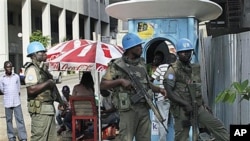The United Nations General Assembly has recognized Alssane Ouattara as the winner of Ivory Coast's presidential election.
The 192-nation world body adopted a resolution Thursday that accepted Ouattara's choice for the country's ambassador to the United Nations. The move gives a boost to Ouattara's bid to unseat Laurent Gbagbo, who has refused to step down after last month's disputed election.
Also Thursday, the Central Bank of West African States said it has blocked funds to Gbagbo, adding pressure on the defiant leader to leave office.
The bank said it would only allow Ouattara's government to access the money, calling Ouattara the "legitimately elected president." Bank ministers from seven West African countries made the decision in Bissau Thursday after meeting to discuss the crisis.
Earlier Thursday, a United Nations official said more than 170 people have been killed in the past week in Ivory Coast. The U.N. deputy human rights chief, Kyung-wha Kang, said the U.N. has substantiated at least 173 killings, 90 cases of torture, 471 arrests, and 24 cases of people disappearing in a five-day period beginning last Thursday.
The U.N. Human Rights Council passed a resolution in Geneva Thursday strongly condemning the killings and other human rights abuses, and calling for an end to the violence.
The U.N. representative to Ivory Coast, Young Choi, told VOA that the situation in the country is very tense and said there are human rights violations everywhere to be seen.
Human Rights Watch also issued a statement Thursday, saying troops loyal to Mr. Gbagbo are making supporters of rival Ouattara "disappear." It said the troops are making nightly raids in pro-Ouattara neighborhoods and dragging people away in official vehicles.
The Ivorian army affirmed its support for Gbagbo Thursday, a day after Ouattara's would-be prime minister, Guillaume Soro, called for other countries to oust Gbagbo by force.
On Wednesday, the United States said it is talking with African nations about boosting the 10,000-person U.N. peacekeeping force in Ivory Coast.
U.S. officials said any move to increase the force would not be aimed at removing Mr. Gbagbo, but rather to deter him from using his own forces to stay in power.
West African leaders plan to hold an emergency summit Friday to discuss the crisis.
The presidential election was meant to restore stability to Ivory Coast, eight years after a civil war split the country into rebel- and government-controlled areas.
Gbagbo has ruled the country since 2000. His term officially ended in 2005, but he remained in office through repeated election delays.
Some information for this report provided by AP and Reuters.




